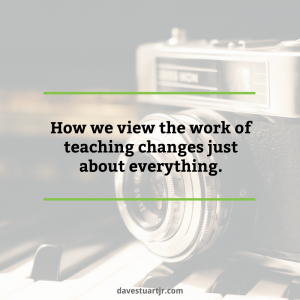 The tasks that comprise our work are not optional. The lens through which we view these tasks, however, is. Following are two lenses through which the teacher's work can be viewed.
The tasks that comprise our work are not optional. The lens through which we view these tasks, however, is. Following are two lenses through which the teacher's work can be viewed.
The Lens of Minutiae
What do teachers do?
We greet students, dismiss students, guide students, counsel students. We collect papers, grade papers, teach papers, assign papers, annotate papers. We read the research, do the research, disprove the research. We study our craft, our students, our colleagues, our school culture, our receding hairlines, our growing midlines. We steal (ideas, mostly); we survive (on caffeine). We analyze: behavior issues, learning difficulties, formative information, summative results, and data data data data. We make lessons that are aligned, intentional, cross-curricular, engaging, interdisciplinary, differentiated, gradually released, research-based, paced, guaranteed, viable, flippable, and with the end in mind. We call parents, email parents, search for contact information for parents, meet with parents, confer with parents, team up with parents, say nice things to parents, tell hard truths to parents. We attend pre-evaluation meetings, post-evaluation meetings, professional development meetings, grade-level meetings, building-level meetings, district-level meetings, school improvement meetings, team-building meetings, AYP meetings, SIT meetings, IEP meetings, EMT meetings. We teach: concepts, procedures, character, academics, life, college-and-career readiness, Common Core, reading, writing, arithmetic, science, social studies, health, music, art, and more — to every student on our roster (and usually quite a few more). We take attendance, print attendance, input an H on count day, track truancy, track tardies. We write up, write down, write emails, write student observation reports, write notes on scrap pieces of anything, on our hands. We manage our classrooms, our students, our minds, our mouths, our time. We make copies, fix copiers, reboot computers, unjam lockers, rig heaters. We create binders, carry clipboards, use apps and duct tape. We learn our content, our standards, our evaluation model rubrics, our texts, and then repeat the process every few years when these things change (again).
This is our work. It is never finished.
The Lens of the Long-Term
What do teachers do?
Every day, we get better at promoting the long-term flourishing of our students.
This is our work. It is never finished.
The Point
How we view our work changes just about everything. Choosing our lens isn't a one-time decision — it's an ongoing discipline. You can ignore this discipline, but the “never finished” nature of our work will eventually crush you. You can practice this discipline, and the never finished nature of our work will propel you.[hr]
This material is excerpted from Dave's well-received, $10 ebook, Never Finished: Continually Becoming the Teachers We Set Out to Be (and Staying Sane in the Process).
Erica Beaton says
This is one of my favorite sections from your Never Finished ebook! Thanks for the reminder, ESPECIALLY in the middle of exam week!
davestuartjr says
No kidding, E — this week is cray.